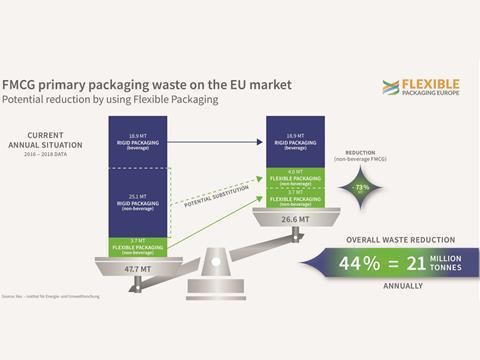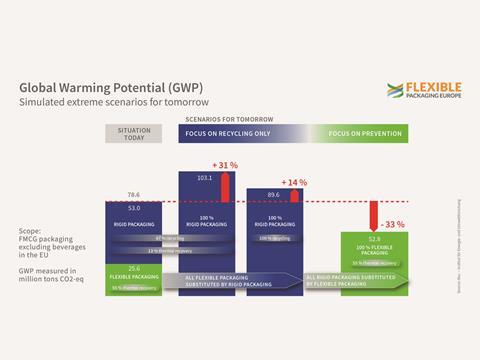
A recently updated and extended study by the Institute for Energy and Environmental Research (ifeu), commissioned by Flexible Packaging Europe (FPE), appears to underline the original study’s findings. FPE says it ‘shows clearly that flexible packaging is a more effective route to resource efficiency and reducing carbon footprint than using rigid packaging formats or focusing entirely on recycling’.
The study uses a scenario in which all non-flexible packaging (i.e. rigid packaging) for Fast Moving Consumer Goods (FMCG) are substituted by flexible packaging wherever possible. As carbonated drinks cannot be packed this way, for the purpose of the study, theoretical substitution excluded all beverages (as a conservative approach).
It showed that, by substituting all rigid packaging of non-beverage FMCG at the EU level, the amount of primary packaging waste could be reduced by 21 million tonnes per year. This means a 70% reduction of the total amount of non-beverage FMCG primary packaging in the EU.
Even more striking, says FPE, are the consequences on the environment. By using a life cycle assessment (LCA) approach the study shows that such a theoretical substitution would decrease total Global Warming Potential (GWP) of all European non-beverage FMCG primary packaging by 33%, even if it is assumed, for the purpose of the demonstration, that no material recycling processes for flexible packaging would take place.
The opposite scenario – the substitution in the EU of all flexible packaging used for non-beverage FMCG by rigid packaging formats – would increase total GWP of the primary packaging to about 30%, according to the study. This is despite the much higher actual recycling rates of rigid packaging. Indeed, even if the recycling rate of rigid packaging was raised to 100%, this theoretical substitution would still lead to 14% higher GWP, it says.
In addition to GWP, the environmental impact of Abiotic Depletion, which refers to the use of non-renewable resources, and Use of Water have also been assessed using the LCA approach. The study shows very similar results in the same order of magnitude for all three impact categories.

The report’s authors conclude that for packaging the focus should not be on recyclability only but also and foremost on prevention. This can be achieved by a higher use of flexible packaging, which would lead not only to less primary packaging waste, they claim, but also to lower carbon footprint and use of resources.
Conversely, they say, a focus only on recyclability and achieving recycling targets might lead to the substitution of flexible packaging solutions by more easily recyclable, rigid packaging. This approach would clearly be detrimental for climate change and resource efficiency, besides running counter to the objective enshrined in the EU Packaging and Packaging Waste Directive to prevent the production of packaging waste.
That said, increasing the recyclability of flexible packaging is key if the industry is to embrace flexible packaging on a wider scale, says Jean-Paul Duquet, director Sustainability FPE, hence the importance of projects such as CEFLEX.
“From a strict circular economy point of view, the small amount of material used in a flexible packaging format is less easy to recycle and the thing is that at a Europe-wide scale flexible packaging it is not yet widely recycled. To rectify this, the flexible packaging converters together with the stakeholders of the entire flexible packaging value chain are joining efforts and actively supporting the CEFLEX project. The objective of having flexible packaging increasingly and significantly recycled in Europe will be achieved by combining improved infrastructures for collection, sorting and recycling, with new technologies to implement, in synergy with optimized design of the flexible packaging structure itself.”
FPE is actively working to shape the conversation around packaging waste – particularly when it comes to the question of resource efficiency. “To help inform and explain the role of flexible packaging, and contribute to fair debate regarding sustainability, FPE has recently created and made available a comprehensive toolkit,” says Mr Duquet. “This puts together flexible packaging and sustainability in visual formats, backed with facts and giving a holistic picture. The aim was to reduce complexity by providing a practical overview with facts and figures, at European level, on much-debated key issues such as circular economy and food waste. The toolkit is available to anyone interested in the subject, from the association’s website.”
















